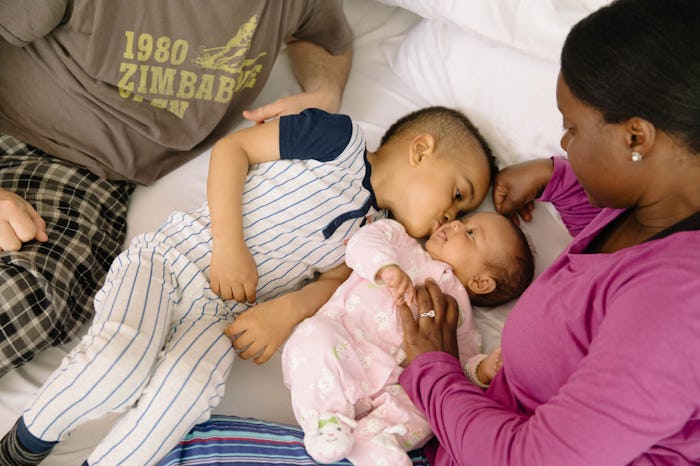When you have a second child, it's natural to worry about your kids and their potential relationship. Will they end up BFFs, or have a serious sibling rivalry? There's no way to know for sure, because fortune telling isn't the most adequate of practices, but what does science say about how and when sibling bonds are forged? Turns out there are actually physical signs your children are bonding, like, right before your eyes, and it's pretty freaking amazing to witness. Trust me.
According to Jeffrey Kluger, author of The Sibling Effect: What the Bonds Among Brothers and Sisters Reveal about Us, sibling bonds are unique and special; different than any other relationship people can experience, As Kluger writes in Time, "From the time they are born, our brothers and sisters are our collaborators and co-conspirators, our role models and cautionary tales." As psychologist Laura Markham, PhD, writes for Psychology Today, that close relationship can often mean fighting. And although constant conflict and sibling rivalry can get on a parent's last nerve, arguments can actually be a sign that your kids are bonding with each other.
According to a review of over 30 studies published in the journal Psychological Bulletin, it is completely normal for older children to struggle with the transition of becoming a big brother or sister. The good news is, however, that they will eventually get past potty regressions and wanting to use a bottle or sleep in your bed. I promise. And the bond they form with their siblings will be with them for life.
They Start Spending Time Together
As Dena Hofkosh, MD, director of the child development unit at Children's Hospital of Pittsburgh, told Parents.com, some older children will completely ignore their siblings for a while. Babies are boring, and they might not be what their sibling expected at all. The good news is that even the most disinterested toddler or preschooler will eventually start interacting with their younger sibling. According to researchers from Penn State University, as reported in Time, by age 11 kids spend more time with their siblings than anyone else, which is pretty amazing when you think about it.
They Fight
As Daniel Shaw of the University of Pittsburgh tells Time, fighting, and perhaps more importantly learning to make-up and get along with your siblings, is great training ground for future relationships. He says, "unlike a relationship with friends, you're stuck with your sibs. You learn to negotiate things day to day." Laura Markham, PhD agrees, adding that physical fighting like wrestling actually produces oxytocin, the same hormone generated by hugs and kisses. Who knew, right?
They Help Each Other
Hofkosh tells Parents that some acting out is completely normal when you introduce new siblings to each other. One way to help them navigate this new relationship is ask your older child to help you, and, by extension, their younger sibling. Eventually, your older child will find ways to help you with baby, which can totally help them bond.
They Stop Regressing
According to a review of over 30 studies published in the journal Psychological Bulletin, it is normal for older children to struggle with the transition of becoming a big brother or sister. Unfortunately, this can manifest as regressions, like acting out, having potty accidents, difficulty sleeping, or becoming overly clingy and demanding of your attention.
According to Parents the best thing you can do when regressions happen is try not to react and remind your older child that they are a big kid. And, according to the Psychological Bulletin report, for most older siblings this tough transition will pass quickly. When it does, it might just mean your kids are beginning to build a bond.
They Play With Each Other
According to Laura Markham, PhD, author of Peaceful Parents, Happy Siblings, it can be hard for siblings to find ways to play with each other, especially when they are different ages or interested in completely different things. She posits that the best way to encourage sibling bonding is to maximize positive encounters. So, when they manage to find a way to play, parents should not get in the way. She writes for Psychology Today, "Don’t interrupt a happily playing child.” Which sounds like something parents of more than one children should totally repeat as a mantra.
Check out Romper's new video series, Bearing The Motherload, where disagreeing parents from different sides of an issue sit down with a mediator and talk about how to support (and not judge) each other’s parenting perspectives. New episodes air Mondays on Facebook.
